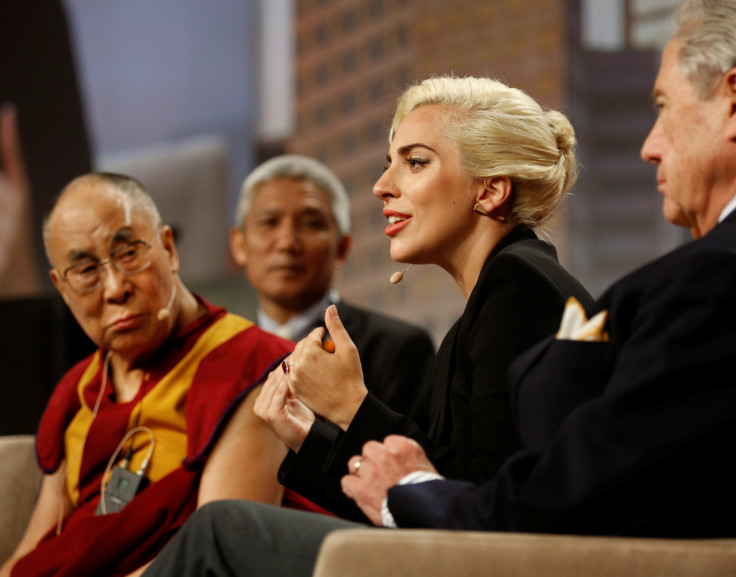Lady Gaga’s China Ban: How And Why The Chinese Government Censors Music Stars

American pop singer Lady Gaga has once again joined the ranks of musicians and artists banned in China. This time, it’s not for showing lots of leg on an album cover or sexually provocative lyrics. Instead, Gaga was blacklisted Monday for meeting with the Dalai Lama.
Gaga is no longer allowed on television, radio or available for online downloads in China (at least legally), says China’s State Administration of Press, Publication, Radio, Film and Television. The ban came after she had met with the exiled Tibetan spiritual leader to discuss “the power of kindness and how to make the world a more compassionate place.” Gaga previously had her music censored in the country for "damaging the nation's cultural security."
Gaga joins a long list of high-profile Western acts who have found themselves censored by Chinese authorities. While non-censored albums are available on the black market, the government goes to great lengths to ensure that songs with sexual content, or content that may undermine the Chinese regime, are kept away from the public. To do that, Chinese officials have stopped records from being commercially released and asked foreign musicians on concert tours to submit lyrics before performing. If the lyrics are deemed inappropriate, the artists aren't allowed to play live.
China also doesn't approve of musicians, or anyone else, associating with the Dalai Lama. The Buddhist cleric fled Tibet in 1959 after a failed uprising against Chinese rule, and has led a government in exile based in India ever since. Thousands of Tibetans have died fighting Chinese forces.
The Chinese music market ranked 19th in the world with just $105 million in sales in 2014. That’s just below Switzerland and Belgium, both of which have tiny populations by comparison. It is way smaller than the U.S., which had nearly $4.9 billion in annual music sales.
Here are some of the top artists who have found themselves facing a Chinese censor.
The Rolling Stones
When the Stones first played a gig in China in 2006, they had to leave out five songs from their set list. Songs like “Brown Sugar” and “Let’s Spend the Night Together” were banned, probably for having sexual lyrics. In 2014, the Stones couldn’t play “Honky Tonk Women.” Lead singer Mick Jagger later mocked the effort, saying he was pleased that the Ministry of Culture was protecting the morals of their expatriate bankers and their girlfriends, according to the Economist.
Bjork
The Icelandic singer’s sin was similar to that of Gaga’s. At the end of a Shanghai show in 2008, she chanted “Tibet, Tibet,” calling for Tibetan independence. Some fans were reportedly offended and a ban was quickly considered.
Uh, Lady Gaga again
Starting in 2011, Gaga was blacklisted by Chinese authorities, who said she was "creating confusion in the order of the online music market, and damaging the nation's cultural security." She was taken off the list in 2014 and her album "Artpop" was allowed to be released in the country, though the cover art was changed. The original featured Gaga sitting naked with her legs spread with a blue balloon between them, her bare breasts covered with her hands. The Chinese version covered her legs with stockings and enlarged the balloon to cover up more of her body, including her breasts.
Miley Cyrus
The singer was banned after making a “slant eyes” face in a photo.
Jay Z
The rap star had a 2006 Shanghai concert canceled after submitting lyrics to the Chinese government for review. They were deemed to be too vulgar.
Maroon 5
Sometimes tweets can get you fired. Sometime tweets can force your world-famous band to cancel tour dates in China. After band member Jesse Carmichael went to a Los Angeles birthday celebration for the Dalai Lama, and then tweeted “happy birthday,” the group canceled 2015 tour dates in the country.
© Copyright IBTimes 2025. All rights reserved.






















